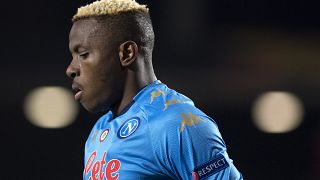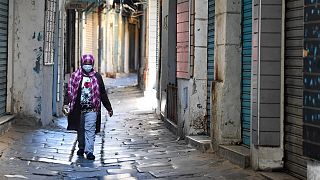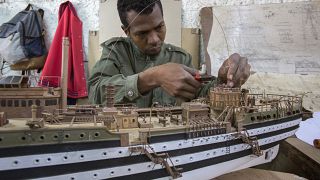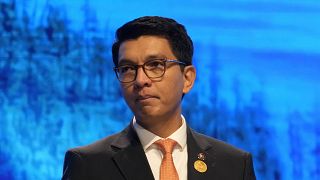Madagascar
In Madagascar, 716 people have officially died from the coronavirus since 23 March 2020, and 38,874 cases have also been recorded.
While the number of deaths seems low compared to many countries around the world, the second wave in recent weeks has been particularly alarming.
In one month, Madagascar has recorded more than 12,900 cases of coronavirus and no less than 240 deaths.
In hospitals, the lack of oxygen and medical equipment has been felt.
But with the arrival of the Covishield - Astrazeneca vaccine, many locals are regaining hope.
In this hospital in Ambatondrazaka, seven hours' drive from the Malagasy capital, seven patients are hospitalised for COVID-19, two of whom have a severe form.
Only one person per patient is allowed to enter the hospital for visits.
Each day for the past three weeks, Raherivelo has been coming to look after her husband.
"Once, there was a power cut and the generators did not work. And when the electricity is less powerful, the oxygen also goes down or stops."
After a month in hospital in Antananarivo, Jean-Pascal Ratovoherimanjato has just been released from the health establishment.
Although he has to take medication for another two months, Jean-Pascal is finally cured of COVID-19.
He recalls his experience while admitted.
"The most difficult thing was that there were not enough oxygen tanks. When the oxygen tank runs out early, we have to wait three to four hours for a new one to be delivered. And in the meantime, several people ventilate me by hand."
On oxygen for 25 days, the 48-year-old father did not expect to survive.
"It was very hard to see people dying next to me. At times it would be my roommate who was dying, I could see him suffering. He would say: 'I can't breathe anymore' and a few minutes later he died."
Faced with the lack of sanitation facilities, the Malagasy government has just received 2,000 bottles of oxygen. The paramedics' union, however, is of the opinion that the hospital still lacks resources.
Jerisoa Ralibera, a nurse and the president of the paramedics' union in Madagascar, explains his perception of the current state of medical affairs.
"There are not enough doctors, there are not enough medicines and oxygen. In 24 hours, a patient suffering from a severe form of the coronavirus needs at least 5 to 6 bottles."
With the arrival of the vaccine on the Big Island, many Malagasy are regaining hope.
As in this centre for diabetes treatment, Faraniaina Ralambotsorofo is one of the very first people to be vaccinated in Madagascar.
She appears glad to have the opportunity.
"I have children abroad. If one day I have to go out of the country, I will be asked for my vaccination booklet. That's why I wanted to get vaccinated, so I can travel."
Special Africanews correspondents **Volana Razafimanantsoa **shares her insight into the COVID climate in the country.
"Since yesterday and throughout the month, 250,000 doses of the vaccine will be administered initially to people with diabetes as well as to health personnel and the police. Despite the reluctance of part of the population, more than 1500 people
Despite the reluctance of part of the population, more than 1,500 people have registered here at this centre in less than a week to receive the Covishield - Astra Zeneca vaccine."












Go to video
Africa CDC endorses Morocco's Mpox test
01:15
WHO: Mpox cases in South Kivu may be 'plateauing', but DRC seeing a 'general rising trend' in cases
01:50
Zipline partners Nigeria for improved healthcare delivery
01:05
Nigeria to roll out a new malaria vaccine
00:53
Bavarian Nordic mpox vaccine gets green light from WHO for use in adolescents
01:45
Rwanda Marburg Outbreak: Health Minister says situation is under control as vaccines underway